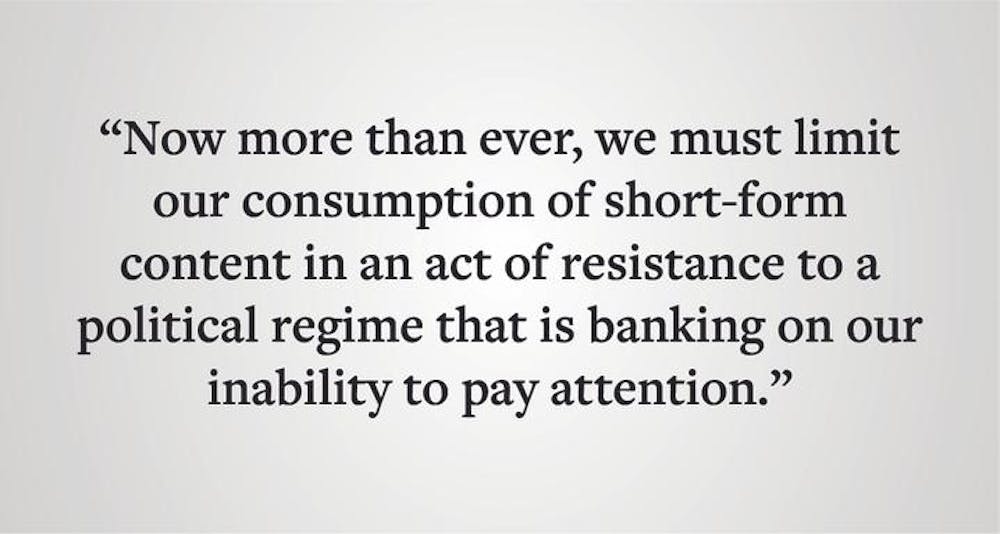On Jan. 15, former President Biden issued an uncharacteristically cogent warning in his farewell address: Americans should beware of an impending oligarchy composed of the wealthiest and most influential billionaires. Implicated in this warning are the tech titans who have cozied up to Donald Trump amid his recent election victory. Although Biden’s warning has been critiqued, social media consumption in 2025 is undeniably political and the race to monopolize our attention is well underway. Now more than ever, we must limit our consumption of short-form content in an act of resistance to a political regime that is banking on our inability to pay attention.
Saying that new technology will ruin our society may seem like the trite grumblings of an out-of-touch baby boomer, but it is a fact that short-form content like TikTok videos and Instagram reels have detrimental effects on our attention spans. Users of the former have coined the term “TikTok brain rot” to describe the combination of symptoms –– anxiety, impaired focus, and a general decrease in cognition –– that accompanies frequent TikTok usage.
Social media companies are well aware that TikTok brain rot isn’t just a tongue-in-cheek phrase. In 2023, Meta was sued by 33 states for deliberately designing an algorithm that lured children into compulsive social media usage despite the dangers it had on their mental health and well-being. To add insult to injury, these companies surveil all users at an unprecedented rate, tracking minute behaviors such as how long we stay on a video and monetizing people’s private data.
This is especially concerning when the CEOs of these very companies are standing on the dais at the inauguration of Donald Trump. Trump has made it clear that he will reward companies that aid his vision of a DEI-free, “anti-woke” America and he will punish dissenters. And CEOs like Elon Musk and Mark Zuckerberg were the first to take heed. Earlier this month, Facebook ended its longstanding fact-checking feature, a program that has been criticized by Trump and his supporters. The men who are controlling our algorithms have bent the knee to Donald Trump, and now the content we consume is at the mercy of his ego.
The first few weeks of the Trump presidency have already tested our ability to pay attention. Within the first 48 hours, a flurry of unconstitutional and unethical executive orders was signed, Elon Musk threw up a gesture that bore an uncanny resemblance to a Nazi salute on live television and a lawmaker proposed an amendment that would give Trump a third term. These stories might have dominated your feed for a few days before eventually being replaced with the next hot topic. You might have felt like an informed citizen because you were consuming video after video of hot takes and discourse. Or maybe you got overwhelmed and latched onto content that was more comforting like makeup tutorials and “get ready with me” videos.
The latter instance suits the motives of our government by diverting attention away from critical issues to content that pacifies and comforts. However, it is the user who is convinced they are fully informed that is in the gravest danger. We assume that watching various short videos for a few days or weeks is the same as keeping our finger on the pulse and staying educated. Short-form content is fleeting, and while the threat of these executive orders and policies will continue to grow, the algorithms of these platforms will have already moved our eyes toward hotter content.
While it is true that social media can be an educational tool, short-form content is not enough to understand a political or social issue thoroughly. Education requires reading, following stories as they progress and individual or communal contemplation. It is a sustained effort of intellectual engagement, a practice that is being eroded by our use of this type of content. Instead of spending hours scrolling, we should reclaim our attention and channel it towards other sources. Consuming long-form media like podcasts, nuanced articles and broadcast journalism forces people to sit down and stay with an issue for longer than 60 seconds. Even more, when we discuss these issues with our friends and family, we build a stronger community, which is the bedrock of political mobilization.
During the Trump-era, social media companies have two aims: keep you watching and keep him happy. Every hour spent scrolling is an hour spent in complacency. It is imperative that Americans, and especially young people (the most likely to engage with this content frequently), limit or eliminate their use of short-form media. Doing so will allow us to reclaim our attention span and increase our ability to stay interested for longer. Paying attention is political.
Kendall Ricks’27 can be reached at kendall_ricks @brown.edu. Please send responses to this column to letters@browndailyherald.com and other opinions to opinions@browndailyherald.com.





